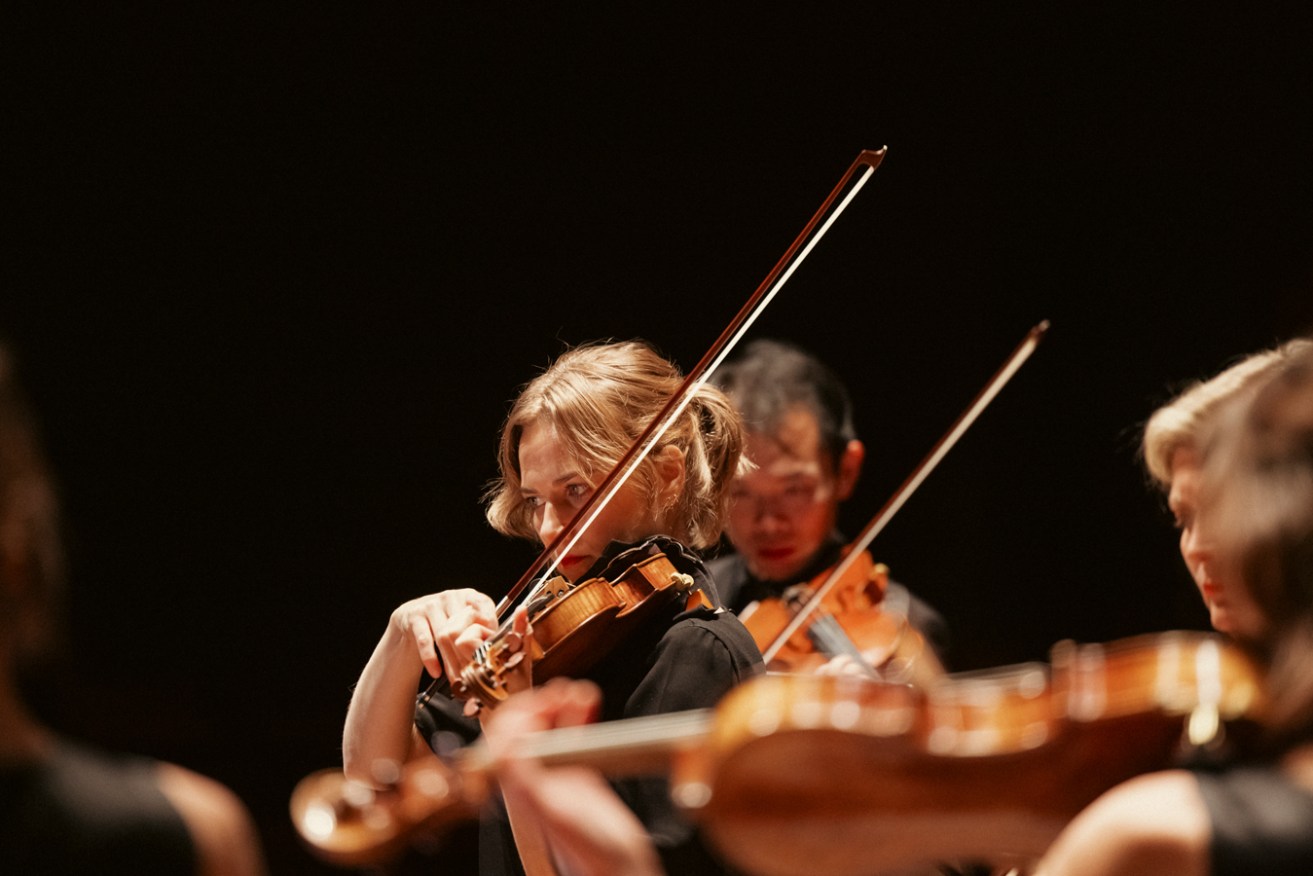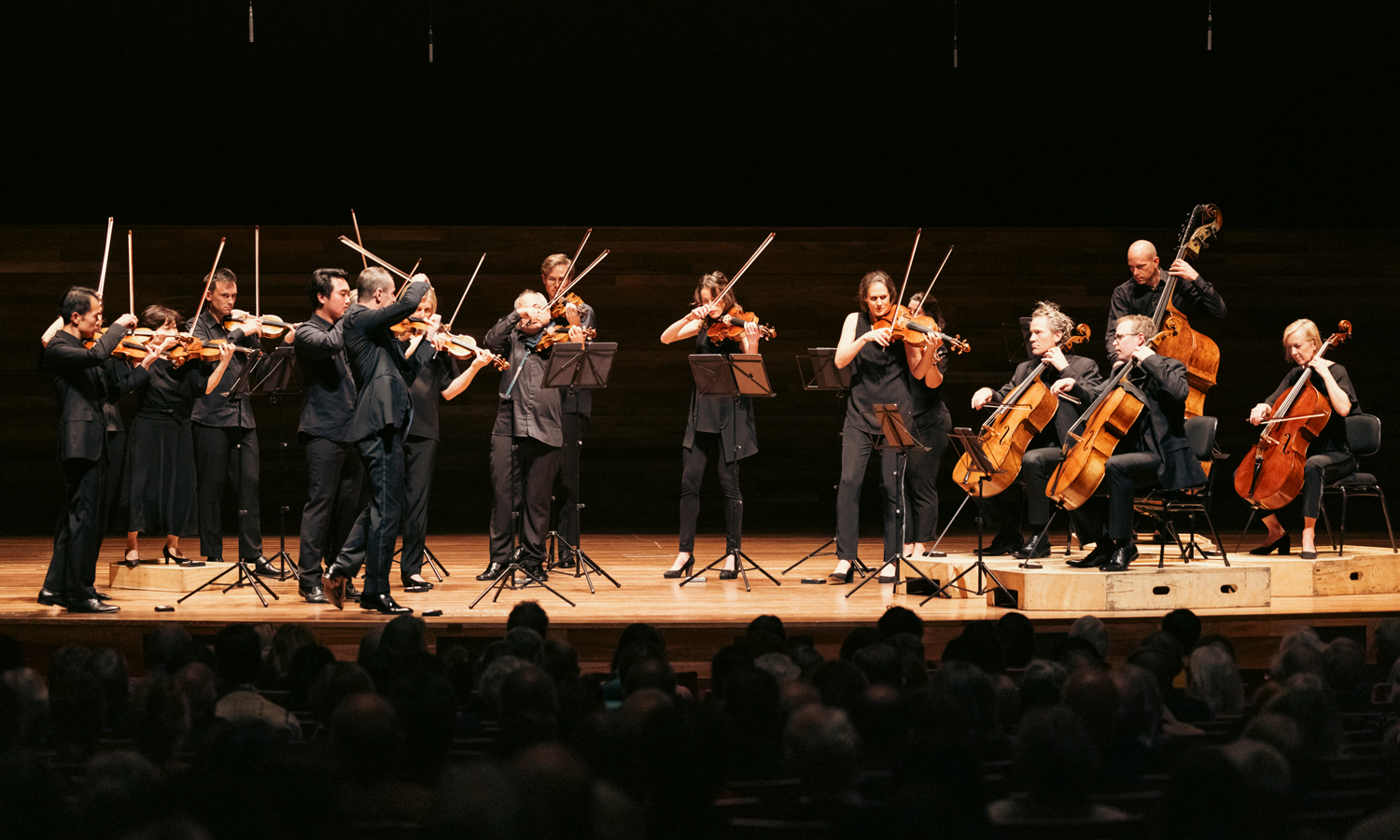Music review: Dvořák’s Serenade
The Australian Chamber Orchestra delivered a tough but invigorating program centring on Bartók’s Fifth String Quartet in an artistically well-judged arrangement of this work by artistic director Richard Tognetti.


The Australian Chamber Orchestra perform 'Dvořák’s Serenade'. Photo: Charlie Kinross / supplied
Apart from the exhilaration and technical sheen of their performances, a major point of interest with the ACO has become arrangements that its leader, Richard Tognetti, makes in order to fill out their programs.
Often what happens is that he takes string quartets and expands them out to exploit the larger sonorities and resources that his group provides.
He has done dozens of these, mainly out of necessity because the repertoire for chamber orchestra is actually quite limited. Tognetti has made this practice of making arrangements into an artform of its own over the years, and usually he shows excellent judgment in the way he enhances texture and colour while maintaining a work’s essential fabric.
This time, it was Bartók’s String Quartet No.5. Others have arranged various of the Hungarian composer’s quartets for string orchestra – among them András Keller and the composer’s younger son, Peter Bartók (who died in 2020) – so it’s not a new idea. However, this one by Tognetti possessed so many audaciously original touches that it fairly grabbed the ear and never let go.
Especially the way the ACO played it. They were phenomenal.
Bow bouncing effects, loud twangs of plucked string, instruments straining their way up to the highest registers, and the most strident rhythms imaginable all made this an electric experience.
Of the six quartets Bartók wrote, the Fifth is the longest and most demanding on both the performer and listener. But Tognetti actually helps the latter in navigating their way through its complex theme clusters and structures by drawing out the starkest contrasts.
The savagery was unremitting, but Bartók is deliberate in wanting this. His quartets are not pretty music; they describe a world, as it were, on the precipice. Given that they were composed in 1934 when the Hungarian government cozied up to the Nazis, this comes as no surprise.
There is one extraordinary moment in the second movement where he relents. Sustained chords in the lower strings radiate rare warmth while solo violin snakes around on top. It is mysteriously beautiful.
Then, of course, the brutality returns, and along with it, banal snatches of folk music. The irony and sheer scale rivalled Shostakovich.
Yet as persuasive as this was, one could not help but ponder how an interior quality of Bartók’s music had gone missing. Here in this enlarged form was essentially a different piece of music – but totally arresting nonetheless.

Classical superstars: The Australian Chamber Orchestra. Photo: Charlie Kinross
Three partnering works offered a modicum of compensatory warmth, but this program was definitely tilted towards the serious.
US composer Caroline Shaw’s Entr’acte, from 2011, has immediate appeal and comes close to being a modern classical hit. A bit heart-on-sleeve and definitely playful in nature, its broken, fragmented main theme has a peculiarly haunting effect.
The ACO captured all this piece’s unpredictable moodiness in a leaned-down performance of impeccable finish.
A momentary dose of salve came after interval with Josef Suk’s tuneful Meditation on the Old Bohemian Chorale 7 “St Wenceslas”, Op.35. Instrumental lines climb over each other gently and lovingly in this work before it gathers unexpected urgency. Strains of the traditional Wenceslas hymn appear where the words cry out, “Let us not perish, nor our progeny!”; and they disclose exactly what this work is about: a rallying call for the Czech people under foreign domination. World War I was shortly to break out when it was written.
It was then from Suk to his composition teacher and eventual father-in-law, Dvořák, for the concert’s most familiar item. With its unaffected, amiable charm, his Serenade for Strings can virtually never fail to impress, and it certainly didn’t with the ACO. Treacly performances can often be the norm, but here the approach was defined by taut rhythmic gesture more than rounded line or any sentimentality.
The vigour of the orchestra’s playing was instantly likeable. It was as if the Serenade had undergone a complete fitness makeover: fed on protein powder and without an ounce of fat.
Just when one felt the players could afford to open out rather more, that happened, too, in the “larghetto”. A sadder cast descended in this lovely, tender third movement.
The ACO comprises highly drilled, top-class musicians whose alertness and precision leaves all others far behind. Under Tognetti, they have become true superstars of the classical world.
The Australian Chamber Orchestra presented Dvořák’s Serenade at Adelaide Town Hall for one night only on August 15 as part of a national tour. The orchestra has just revealed its full 2024 season, which will see it return to Adelaide with five concerts throughout the year.
This article is republished from InReview under a Creative Commons licence. Read the original article.
InReview is an open access, non-profit arts and culture journalism project. Readers can support our work with a donation. Subscribe to InReview’s free weekly newsletter here.
![]()




